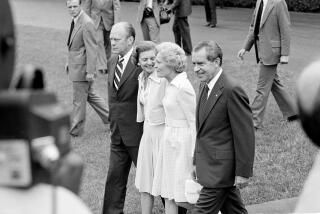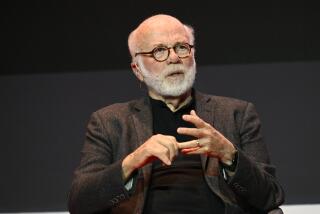Ford to Chapman: A Legacy Drops In
- Share via
While the nation is trying to decide how President Bill Clinton’s legacy will be judged, four Chapman University students who critiqued Gerald R. Ford’s unique term in office got to hear his reactions firsthand Saturday.
The event, sponsored by the school’s Center for Cold War Studies, culminated a two-day symposium that highlighted the Ford presidency. Four students in John Robert Green’s American Political History class wrote essays on a range of topics, from economics to the two assassination attempts on Ford, and read them to Ford before an audience of nearly 200.
But it was a huge “Drop Dead” headline in the New York Daily News nearly two decades ago that apparently stung Ford even more than the attempts on his life--and evidently still stings to the point that the ex-president brought it up himself.
“Did anyone do a paper on the New York City financial fiasco?” asked Ford.
In October 1975, Ford rejected a federal bailout for New York City, which at the time was flirting with bankruptcy. His decision not to lend a helping hand sparked outrage among New Yorkers and provoked the tabloid’s headline: “Ford to City: Drop Dead!”
“Even today,” an animated Ford said, “the press does not understand about what transpired in the New York City financial crisis. . . . The media, in their laziness, they do not care to research what really happened.”
According to Ford, New York City leaders wanted to open up the city treasury to pay employee pensions and compensation that would have drained the coffers. Ford did not want the government to underwrite such “irresponsible” spending with federal grants, and instead insisted on loaning the city money--”with interest” tacked on, Ford said smiling.
“I believe we made some money on that loan.”
Ironically, 20 years later, when Orange County suffered the nation’s largest municipal bankruptcy, it too got a cold shoulder instead of a bailout from then-Gov. Pete Wilson and the state Legislature. A few Democrats at the time compared Sacramento’s initial response in the Orange County case to Ford’s refusal to bail out New York City.
One of the four students, Jeff Castillo, 23, a political science major, chose economics for his essay because he saw parallels between Ford at the outset of his administration and George W. Bush.
While Ford’s ascension to the presidency is most often associated with the nation’s trauma over Watergate--he was the only president never elected to a national ticket--that period was also marked by high rates of unemployment and “stagflation.” To jump-start the economy, Ford’s key economic advisors, Alan Greenspan and William Simon, suggested a tax cut, similar to what Bush has proposed, for businesses and individuals.
Ford, who months earlier has called for a tax increase, said he at first opposed any tax cut, while Democrats pushed for a large one. But “after careful reconsideration,” his administration changed its position midstream, a move some in Congress labeled a flip-flop.
“By 1976, we had inflation down to 4.8%, the prime interest rate was at 6 1/4% and unemployment was at 5.1%. We were headed in the right direction,” Ford said.
One of the more poignant moments came when Meghan Tidgewell, 24, a social science major, read her essay on the two assassination attempts on Ford’s life, both in California. They involved Lynette “Squeaky” Fromme and Sara Jane Moore.
As the audience grew still, Ford lightened the moment by describing what he told his wife, Betty a well-known supporter of women’s causes, including the Equal Rights Amendment.
“Now here was a situation where two ladies tried to shoot me,” Ford said. “So when I returned to Washington, I said to my dear wife, who was a proponent of the ERA, ‘I’m going to have to reconsider my stand.’ ”
The two other students included Amanda Levy, 20, a political science major, and Pamela Doddridge, 38, an accounting major.
More to Read
Sign up for Essential California
The most important California stories and recommendations in your inbox every morning.
You may occasionally receive promotional content from the Los Angeles Times.












